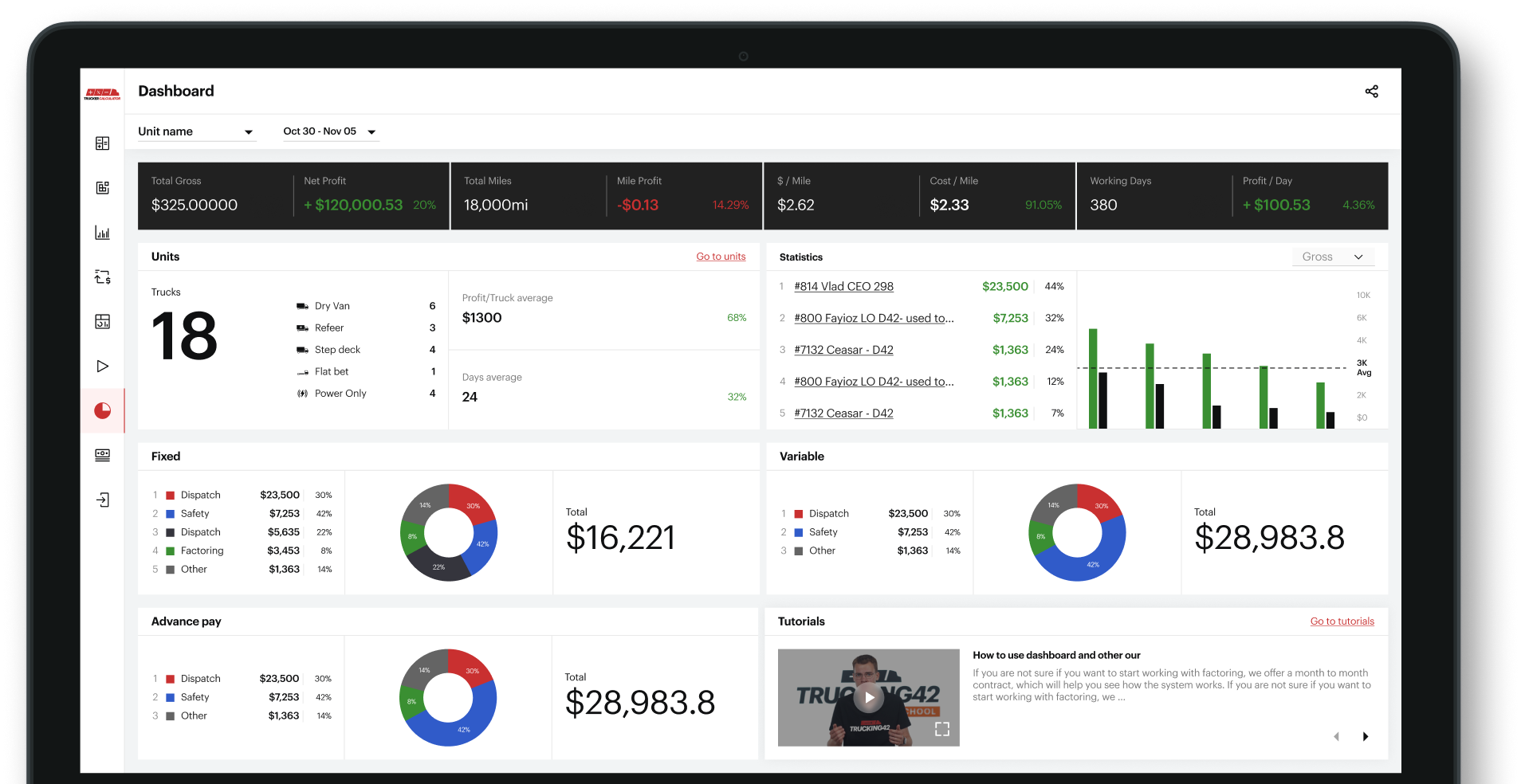Our Blog
We want to make financial management easy and accessible for trucking business owners.
Read about us in various articles.

Our Blog
We want to make financial management easy and accessible for trucking business owners.
Read about us in various articles.


45,870+
Truckers calculated Net Profit


$424,365,300
Actual money Saved


1,247,659
Truckers calculated Net Profit


33.3%
Annual profit growth

5 tips for managing your owner-operator business finances
“Are you considering starting a trucking business as an owner-operator, but concerned about the financial challenges? You’re not alone.” - by FreightWaves
Are you considering starting a trucking business as an owner-operator, but concerned about the financial challenges? You’re not alone.
As an owner-operator, you’ll face low profit margins, high startup costs, and unpredictable cash flow. However, with the right tools, technologies, and financial management strategies, you can successfully manage your finances on a budget.
In this article, we’ll explore the main financial challenges for owner-operators; financial tools and technologies; and tax and financial management advice.
And when you’re finished reading, check out the other articles in our “How to become an owner-operator” series:
1. How to become an owner-operator truck driver
2. How to finance a trucking business
3. How to find customers and loads for owner-operators
4. Managing your owner-operator business finances
Main financial challenges for owner-operators
Income inconsistency
One of the major challenges faced by an owner-operator truck driving business is the fluctuation in income. The income of an owner-operator is dependent upon various factors, like the number of loads moved, client rates, service demands and operating costs. As a result, the income of an owner-operator can be unpredictable and may sometimes experience sharp drops.
Maintenance costs
Maintenance costs for trucks and other equipment can be considerable, especially for trucking companies that manage older fleets. Proper truck maintenance is essential for safety and compliance, but it can be costly for owner-operators who need to cover all the expenses independently.
Rising fuel costs
Fuel represents a significant proportion of trucking costs. High fuel prices reduce profit margins and can further exacerbate the income inconsistency faced by owner-operators.
Financial management
Managing finances is a challenge for any business owner, including owner-operators. Limited capital, high start-up costs, and ongoing expenses make financial management a daunting task. Proper financial management, including bookkeeping, cash flow management, and taxes, is essential for the long-term success of an owner-operator trucking business.
Load availability
The availability of loads is an essential factor that can affect the income of an owner-operator. There are times when the demand for trucking services is low, resulting in drivers being unable to find loads. This leads to idle trucks, which results in a loss of income.
Insurance costs
Owner-operators need to ensure that they have adequate insurance coverage to protect their business investments. It is crucial to consider all insurance costs to manage the risks that come with driving a truck. Depending on the coverage required, insurance costs can represent a considerable expense for owner-operators.
Compliance with government regulations
Owner-operators must comply with governmental trucking regulations, including hours-of-service rules, inspection requirements, safety protocols, and other compliance issues. The cost of compliance can put pressure on the finances of smaller owner-operators who may not have the resources to manage the ever-changing guidance. Failure to comply with regulations can result in fines, penalties, and even the loss of operating licenses.
Tools and technologies that can help owner-operators manage finance
Fuel cards
Fuel cards offer many benefits for trucking companies. They offer discounts and rebates to trucking companies on fuel purchases. These discounts and rebates can help reduce fuel costs and increase profitability. They help you to track fuel consumption and manage fuel expenses by reducing administrative tasks related to fuel expenses.
With fuel cards, companies can eliminate paperwork, streamline reporting, and reduce the time spent on expense management. Check out the best fuel cards for owner-operators.
Load boards
Load boards provide real-time pricing and market data that can help owner-operators set competitive, demand-responsive rates. Some load boards include built-in credit check, invoicing and reporting capabilities that help streamline financial management activities. These tools can prove invaluable to owner-operators who don’t have dedicated accounting resources — or much time to spare.
Software packages
Independent trucking companies can use relatively inexpensive owner-operator accounting software or trucking software for small fleets to help track expenses, issue trucking invoices and process payments.
Sometimes these platforms offer budgeting, payroll and business planning capabilities as well, either as included features or optional, add-on modules. These more comprehensive software packages are ideal for businesses that expect to grow, which are better served by scalable solutions. They can, for instance, help ensure tax compliance, monitor cash flow, create financial forecasts, generate income statements, and more.
Mobile apps
There are also online or mobile-based apps that can go a long way toward addressing owner-operators’ straightforward financial needs. App-based expense management tools, for example, help with receipt tracking and reimbursement processes.
Payment processing tools can ensure that owner-operators receive payments easily and securely via credit card, e-checks, or online payment. Additionally, free online calculators allow owner-operators to get a snapshot view of the financial health of their business.
5 financial management tips for an owner-operator business
The most important financial management tip is to keep detailed, organized records, including receipts and all expense- or income-related documentation. Doing this on an ongoing basis will help avert last-minute tax season scrambling, and potentially prevent costly mistakes or fines.
With that out of the way, here are more valuable tips to consider:
Take advantage of trucking tax benefits: Familiarize yourself with the tax code and take advantage of any deductions and credits you may qualify for. Consider contributing to tax-advantaged retirement accounts, such as a 401(k) or IRA.
Create a budget: Creating a budget is an essential step in financial management. Analyze your company income and expenses and create a plan for spending and saving. Remember to allocate funds for savings and emergency expenses (like truck repairs).
Minimize debt: Reducing debt can greatly improve your financial situation and your ability to manage taxes. Avoid high-interest credit cards and consider consolidating or refinancing existing debt for a lower interest rate.
Hire a professional: Consider hiring a tax professional or financial advisor to help manage your company finances and navigate tax laws. They can provide valuable advice and assistance in creating a financial plan and minimizing tax liabilities.
Effective financial management is a worthwhile investment
Making money in trucking is directly tied to how well you manage your finances. In fact, it can be a deciding factor in the long term success of your business.
Along with helping you to maintain your cash flow, proper financial oversight can minimize your tax liabilities, and fuel progress toward long-term financial goals. Retirement savings, new equipment and business expansion, for example, are each made more attainable with responsible financial management practices. And it’s never too late to start, so even if you’ve been an owner-operator for years, you can still benefit from these tips.
FAQ
How do I keep track of trucking expenses?
As a truck driver, you can keep track of expenses by using expense tracking apps or software, which allow you to log costs like fuel, maintenance, insurance, and meals.
How much do owner-operators make?
Earning can greatly vary based on factors like freight type, distance traveled, and business expenses. On average, they can make between $50,000 to $170,000 per year.
How do I pay myself as an owner-operator?
You can pay yourself by setting up a reasonable salary or draw a percentage of your business earnings. Just make sure to set aside funds for taxes, business expenses, and future investments.
What clients say about us

Casey LaDelle
280 000 - subscribers
What truckercalculator.com does, it helps owner operators and fleet owners track all their expenses, right down to the penny!

ALVIL
52 000 - subscribers
В truckercalculator.com можно рассчитать реальный профит и узнать, сколько вы реально зарабатываете.

The 717 Trucker
6 000 - subscribers
I’ve been impressed by what i’ve seen so far, this is a resource to help you figure if you are actually making money

Never Stop Trucking
32 000 - subscribers
You can use it as an MC owner, operator or a dispatcher, to calculate costs for loads and explain to owner.
Frequently Asked Question
Do I really need to know my numbers in trucking?
Definitely yes. You don't want to run any business without confidence in that actions you make will be profitable for your business. Trucking is not an exception - you want to know your trucks are working for you, not you for them.
Is Cost per Mile calculator good for Owner Operators?
Owner-operators can use the Trucker Calculator to constantly track net profit and cost per mile, ensuring they operate at peak efficiency. This tool can also export detailed PDF profit and loss statements, which can be used to secure a bank loan and provide transparency regarding your finances.
What is my cost per mile?
Cost per Mile, or CPM is a trucking metric that represents your Bottom Line.
Basically, to stay profitable your Rate per Mile has to be above your Cost per Mile.
What will i know after using Dashboard for MC Owner?
You will know your company's net profit and cost per mile, and also the top 5 best and worst trucks based on Gross, Net Profit, Rate per Mile, Total Miles, Expenses, and Cost per Mile.
How can I increase my net income using Statistics for MC Owners?
You will compare which option brings you more profit—Dry Vans, Open Decks, or Reefers. Review weekly performance for each truck, identify highlighted money losses, and receive comprehensive Profit and Loss reports for your entire trucking company, specific trucks, or even a single truck over years, quarters, months, and weeks.
How Distribution will help accountant of my trucking company?
Your accountant can upload a bank statement with all incomes and expenses for any period directly into the Transaction Distribution system for Motor Carriers. You can manage the entire cash flow, specific income or expense transactions, or manually add specific trucking loads on the go.
Why do i need to know cost per mile?
Cost per mile helps you understand the effectiveness of your trucking business and highlights areas where you're spending too much. Constantly tracking your cost per mile will help you maintain the most efficient fleet and book the best loads for your business.
How to Calculate Cost per Mile?
To calculate your cost per mile, you need to sum your total expenses and then divide by the total miles driven. Ensure you use all miles, not just loaded miles—this is the only way to determine your true Cost per Mile accurately. Use odometer readings or your ELD information for this calculation

